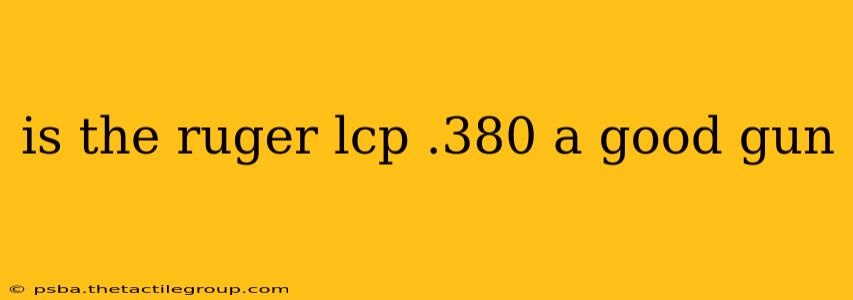Is the Ruger LCP .380 a Good Gun? A Comprehensive Review
The Ruger LCP .380 has earned a reputation as a popular pocket pistol, but is it good? The answer, as with most firearms, depends on individual needs and priorities. This review delves into the pros and cons to help you decide if the Ruger LCP .380 is the right choice for you.
Strengths of the Ruger LCP .380
-
Concealability: This is arguably the LCP's greatest strength. Its small size and lightweight design make it incredibly easy to conceal, making it ideal for everyday carry (EDC) in a pocket or purse. The slim profile minimizes printing (the outline of the gun showing under clothing).
-
Reliability: Ruger has a strong reputation for building reliable firearms, and the LCP .380 generally lives up to that expectation. While occasional malfunctions can occur with any firearm, especially with less-than-ideal ammunition, the LCP is known for its robust design and consistent function.
-
Affordability: Compared to other pocket pistols, the Ruger LCP .380 is relatively inexpensive, making it an accessible option for those on a budget. This affordability doesn't necessarily compromise quality, as Ruger prioritizes reliable functionality.
-
Ease of Use: The LCP .380's simple controls are straightforward, making it relatively easy to learn and operate, even for novice shooters. The lightweight nature, while beneficial for concealability, can also make it easier to manage recoil for smaller-framed individuals.
Weaknesses of the Ruger LCP .380
-
Recoil: While manageable for many, the LCP .380's lightweight design can lead to noticeable recoil, particularly for those with less shooting experience. This can affect accuracy and potentially lead to flinching.
-
Small Sight Radius: The short sight radius makes precise aiming more challenging, especially at longer distances. This isn't a major concern for close-quarters self-defense scenarios, its primary intended use, but it limits its versatility.
-
Limited Capacity: The magazine holds only six rounds, which is a relatively low capacity for a self-defense firearm. This necessitates careful shot placement and emphasizes the importance of training and proficiency.
-
Trigger: The trigger pull is often described as stiff and gritty by some users. While this can be improved with aftermarket modifications, it's a common complaint among LCP .380 owners. This can negatively impact accuracy and speed.
Alternatives to Consider
Before making a decision, it's wise to explore alternatives. Other pocket pistols on the market offer similar concealability but may address some of the LCP's weaknesses, such as improved ergonomics, larger magazine capacity, or smoother trigger pulls. Researching competitors is crucial to making an informed choice.
Conclusion: Is it Right for You?
The Ruger LCP .380 is a viable option for concealed carry, particularly for those prioritizing affordability and ease of concealment. However, its limitations regarding recoil, sight radius, magazine capacity, and trigger should be carefully considered. If these weaknesses outweigh the benefits of its size and price, exploring alternative pocket pistols is highly recommended. Always prioritize proper training and responsible gun ownership regardless of your chosen firearm. Consider your individual needs, skill level, and shooting experience before making a purchase. Remember, a gun is a serious responsibility.

